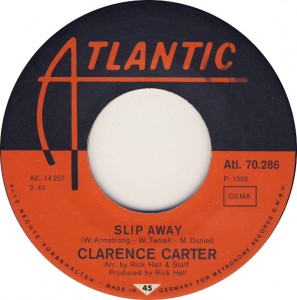
 Here’s something that I never knew; when Etta James released her soul classic “Tell Mama” in 1968, it was an answer record, and the record it was answering was “Tell Daddy,” which had been released by Clarence Carter the previous year. It’s one of those rare examples in which the answer was more successful than the original. Can you think of another?
Here’s something that I never knew; when Etta James released her soul classic “Tell Mama” in 1968, it was an answer record, and the record it was answering was “Tell Daddy,” which had been released by Clarence Carter the previous year. It’s one of those rare examples in which the answer was more successful than the original. Can you think of another?
I hadn’t thought of this before, but for the second week in a row I’m writing about an artist who overcame blindness to achieve major success in the music world. Carter got his start in music when he teamed up with Calvin Scott, who was also blind. The team, known as Clarence & Calvin, and later the C&C Boys, released their first single on the Fairlane label in the early ’60s.
After a second unsuccessful single, the pair moved to Duke Records. Four singles followed, and none of them made a dent on the chart. The duo must have thought they had it made when they released a single in 1965 that they had recorded at the legendary FAME Studios in Muscle Shoals, especially when it was released on Atlantic’s ATCO subsidiary. Sadly, “Step By Step” also failed to have much impact.
When Scott was injured in a car accident, Carter soldiered on as a solo artist. He continued working at FAME Studios, and recorded for the Fame record label. “Tell Daddy” made it to #35 on the R&B chart in 1967, and when “Tell Mama” hit it big the following year, Carter got a writing credit.
At the end of ’67, Carter moved up to Atlantic Records, but kept recording with the storied Fame studio crew. Massive solo success came in 1968 when “Slip Away” reached #2 on the R&B chart, and #6 on the Pop chart. Carter’s followup single, “Too Weak To Fight,” did almost as well as did the provocative “Back Door Santa.”
The hits kept coming. Beginning in 1969, a string of singles that included “Snatching It Back,” “The Feeling is Right,” “Doin’ Our Thing,” and “I Can’t Leave Your Love Alone” all made noise on the charts. But Carter’s biggest hit was still ahead. In 1970 “Patches” took him to #4 on the Pop chart, and #2 on the R&B chart. Incidentally, the original version of “Patches” was released by the Chairmen of the Board earlier that year. Carter’s version sold a million copies within two months, and won him a gold disc as well as the Grammy award for Best R&B Song.
Carter’s subsequent releases didn’t do as well, and by the end of 1971 he had left Atlantic to return to the Fame label. By 1975 he had moved on the ABC Records where he released three albums. Then disco came along and put a major hurting on Carter’s career. It wasn’t quite over for Carter though. In 1985, while signed to Ichiban Records, he released a single called “Strokin’.” Released may not be the proper term however. The record was thought to be too explicit for radio, so instead the label put it in jukeboxes, where it was discovered by bar patrons in large numbers. The song was later featured in a couple of movies, including Eddie Murphy’s “The Nutty Professor.”
Like many classic soul artists, Carter found new renown when his records were sampled by hip-hop artists. That’s the horn break from “Back Door Santa” that you hear on Run DMC’s “Christmas in Hollis.”
Clarence Carter continues to tour the world. Catch him if you can.
[youtube id=”V5GhAGb5rY0″ width=”600″ height=”350″] [youtube id=”QPy2YGm0mQ8″ width=”600″ height=”350″]




Comments